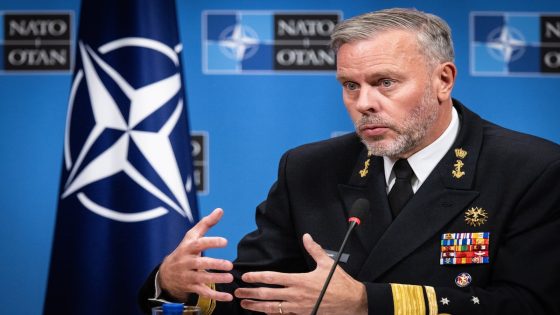NORFOLK, Virginia â Rob Bauer was in a joking mood.
The admiral chairs NATOâs Military Committee, which makes him the allianceâs top military official. This week he was in Norfolk for a change of command.
Wearing his white dress uniform with an ornate saber, he spoke to the incoming and outgoing generals, addressing them by their first names: âDear Pierreâ and âDear Phillippe.â
Several times, the crowd laughed at his small bits of sarcasm.
It was a rare moment of levity for an alliance under strain. NATO has by some measures excelled in the last two years, after Russiaâs full-scale invasion of Ukraine. More members spend the required 2% of GDP on defense than ever, and itâs added two impressive new states: Sweden and Finland.
Still, Ukraine is steadily losing ground to Russia, which now threatens to take the vital city of Pokrovsk in the east. And the debate over how far Kyiv can fire Western weapons into Russia has become a divisive, monthslong saga.
Hence the tone, which Bauer kept up while speaking with Defense News later. He sketched on a sheet of copy paper to illustrate different arguments. At one point, while lampooning the Westâs sluggish production of weapons, he swore.
The admiral discussed the security of front-line states in NATO, bringing new members into the alliance and how hard itâs been to ditch old ideas about how the West defends itself.
This conversation has been edited for length and clarity.
I wanted to ask about the security of the Baltics. Where do you see changes occurring after the Washington summit in that region? And do you see Putin making plans for any sort of operation in the eastern flank?
Well, if heâs wise, he shouldnât. But thatâs basically what our deterrence is about: to make sure he understands that itâs not a good decision. We are vigilant all across those domains to make sure they know that we are ready.
Thereâs a lot of rhetoric over the last two and a half years on what the Russians could do. In general, we see no real increase in the attempts of the Russians to escalate with us. If you look at Baltic security, the fact that Sweden and Finland have joined NATO is very important for our ability to be in a much better position in the Baltic than before. We now see the first signs of NATO forces that, maybe not permanently, are working and training and exercising in Finland.
The Nordic nations are working more closely together now that basically, Norway, Denmark, Sweden, Finland are all part of that region. They have made agreements on the use of each otherâs airspace, and thatâs great news. It means that our ability to operate faster and much more effectively in each otherâs space, whether itâs airspace or land mass or water, is helping.
It is not only the Washington summit, but it is the joining of Finland and Sweden. Itâs the regional plans. It is the fact that we have been working on this for a much longer time that we now see practical examples coming forward where nations start to work together and benefit from that membership.
You mentioned the two newest members of NATO. Do you have any sense right now of what the rotational force presence will look like there?
Itâs very early to say that. The nations have come forward with their intent, and they are working on the details now. Itâs not something that NATO has organized. It is something that the nations have agreed upon.
Actually the same happened in the past when we build those battle groups in the southeast. You had battle groups in Slovakia, Hungary, Romania and Bulgaria. In Bulgaria, the Americans talked to the French and to Romania. Then at some point, the French came in, and the Dutch joined and the Belgians and forces from Luxembourg. Now itâs an established thing where they are able to beef up to a brigade. That was a bilateral or trilateral discussion, and then those forces were handed over to NATO under command of the Supreme Allied Commander Europe.
And thatâs how you expect it to go?
What we will see first is a number of discussions amongst the participating nations. I donât know whether it will only be Sweden and Finland. It might be other nations as well that are being asked to join. Once that is clear, then they will set up command and control with NATO, where it comes under the Supreme Allied Commander Europe. Thatâs my expectation. But of course, as always in NATO, nations are sovereign states. So therefore, if Finland would like to do it differently thatâs possible.
The talk in Washington right now in regard to Ukraine is the use of long-range fires. I know that youâve said thereâs a legal basis for this. It would be helpful if you could respond to the two things that U.S. leaders are saying now as arguments against it. One of them is that Russia has moved many of its airfields beyond the 300-kilometer (180 mile) threshold. The other one is that Ukraine has its own sophisticated drone capabilities.
Iâm not going to comment on the arguments that the nations use. Thatâs for them. I mean, you have to ask [Chairman of the Joint Chiefs Gen.] CQ brown in the U.S.â¦
We do.
⦠and ask them why they use those arguments.
It is militarily wise and smart to actually attack your attacker in his back garden, so that that you become safer. Thatâs what you do, as [the Ukrainians] have had in the last couple of weeks â some serious successes in terms of missile depots and fuel depots and things like that. It will hamper [Russiaâs] ability to continue their fight, and thatâs great.
Secondly, it is legally possible. It is supported by law because itâs part of self defense, and self-defense doesnât stop at your border. Thereâs no military reason to deviate from what I said. Thereâs a political reason.
I was fascinated by what you said in your speech outside about the old frameworks, about industrial based cooperation. Could expand on what the new framework would look like and whether that would involve more state control?
Not necessarily. I think weâve over-focused on efficiency for all sorts of understandable reasons, because the governments wanted to spend as little money as possible, and the industry wanted to spend to earn as much as possible, and stocks are stupid.
Thatâs what we did for 30 years, because everything was planable. Are we going to Afghanistan? In the North Atlantic Council, we talked about this for a month. Then we talked about how many troops and what they are going to do. If you knew then that you needed in a certain place a battalion, then you would say, âOkay, this is the Netherlands, and then comes France.â We bought extra helmets and we bought extra boots. And we started the training just in time. It was all controllable.
Itâs not that we will say to the Russians, âWhoah weâre not ready. This is not fair. We told you last week, weâre not ready. We can fight you on the first of July.â Theyâll say, âIâm gonna attack you now.â
The change is that we want more, readier soldiers so if the enemy attacks, we are ready. Itâs not only the soldiers that we need but also the tanks and the armored vehicles and the ammunition and everything.
Therefore we now see a surge in the the things we want to buy in the defense industry. We have basically destroyed that industry together. First in the early 90s, that was the peace dividend. We say, âYou have to produce,â and then they say, âYeah, right, but do you remember when we had all these factories, and now theyâre gone because you didnât buy anything?â
I want the industry to become part of the values discussion, not just the value discussion. They need to understand that they have a strategic interest in strong defense, because for 80 years, all these private companies have been able to earn a lot of money on a very stable, safe and secure environment, which was our continent. The CEOs in Ukraine are laying awake because their factory might be gone tomorrow morning because of a missile attack. Thatâs not in the thinking of the CEOs in the Netherlands or in the U.S. They should understand that they need to be part of the solution.
Second, because we have a economy which is not an autocracy, we need to convince investors that itâs a good idea to invest in the defense industry.
I am telling all these people deterrence is the best investment. What is deterrence? The seven-foot bouncer that is in front of the nightclub will probably stop you if you wanted to go in without paying, right?
Iâm 6â²1â³, 160 pounds, so probably.
Especially if he has a black belt in karate, and he maybe even has a weapon on him. If the bouncer is 4â²2â³, you will push him aside and you will go in. Now that is deterrence. It is about making sure that our opponents, whether itâs the Russians or terrorist organizations, know that if they attack us, itâs actually a big mistake.
All these things we are talking about are not to start a war. Iâm not a warmongering idiot, what I sometimes read in social media. It is actually to prevent war, and I think that is a good investment for our society, if we can continue to prevent war, as we have been able to do for the last 75 years.
And the world is becoming a more dangerous place because what we see is the rebalancing of power between the U.S. and China.
Noah Robertson is the Pentagon reporter at Defense News. He previously covered national security for the Christian Science Monitor. He holds a bachelorâs degree in English and government from the College of William & Mary in his hometown of Williamsburg, Virginia.
Source Agencies


